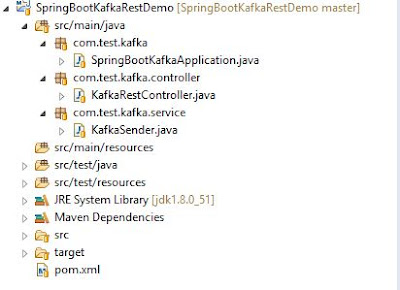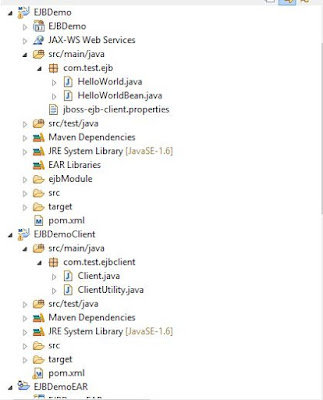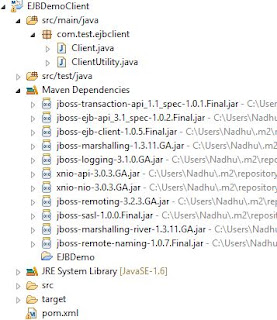Nadhamuni Blogs
MAN CAN DO...
Dec 12, 2017
Dec 3, 2017
Dec 2, 2017
Spring Boot Apache Kafka (Restful Services ) Demo

Kafka download URL:
http://kafka.apache.org/downloads.html
Unzip in to location
Start Apache Zookeper (Open a new command)
D:\j2ee-workspace-neon\kafka_2.11-1.0.0>.\bin\windows\zookeeper-server-start.bat .\config\zookeeper.properties
Start Apache Kafka (Open a new command)
D:\j2ee-workspace-neon\kafka_2.11-1.0.0>.\bin\windows\kafka-server-start.bat .\config\server.properties
Start Topic (Open a new command)
D:\j2ee-workspace-neon\kafka_2.11-1.0.0>.\bin\windows\kafka-console-consumer.bat --bootstrap-server localhost:9092 --topic kafka_test_topic --from-beginning
Test url:
http://localhost:8080/kafka-rest-demo/producer?message=test
Git Source
https://github.com/knmuni/SpringBootKafkaRestDemo
Thank you :)
Nov 5, 2017
Oct 29, 2017
MyBatis with Spring Boot Example
Eclipse Project Structure
Git : https://github.com/knmuni/MyProjectWorkspace#spring-boot-mybatis-mysql-example
Oct 16, 2016
A Simple EJB3 project (Jboss-as-7.1.1 , Eclipse and Maven)
Eclipse Project Structure (EJB & Client
EJB Demo (EJB project)
package com.test.ejb;
import javax.ejb.Remote;
@Remote
public interface HelloWorld {
public String sayHello();
}
2. HelloWorldBean
package com.test.ejb;
import javax.ejb.Stateless;
/**
* Session Bean implementation class HelloWorldBean
*/
@Stateless
public class HelloWorldBean implements HelloWorld {
/**
* Default constructor.
*/
public HelloWorldBean() {
// TODO Auto-generated constructor stub
}
@Override
public String sayHello() {
// TODO Auto-generated method stub
return "Hello World !!!";
}
}
3. jboss-ejb-client.properties (This needs to be under SRC folder)
remote.connectionprovider.create.options.org.xnio.Options.SSL_ENABLED=false
remote.connections=default
remote.connection.default.host=localhost
remote.connection.default.port = 4447
remote.connection.default.connect.options.org.xnio.Options.SASL_POLICY_NOANONYMOUS=false
remote.connection.default.username=userName
remote.connection.default.password=password123
4. pom.xml
<project xmlns="http://maven.apache.org/POM/4.0.0" xmlns:xsi="http://www.w3.org/2001/XMLSchema-instance"
xsi:schemaLocation="http://maven.apache.org/POM/4.0.0 http://maven.apache.org/xsd/maven-4.0.0.xsd">
<modelVersion>4.0.0</modelVersion>
<groupId>EJBDemo</groupId>
<artifactId>EJBDemo</artifactId>
<version>0.0.1-SNAPSHOT</version>
<packaging>jar</packaging>
<name>EJBDemo</name>
<url>http://maven.apache.org</url>
<properties>
<project.build.sourceEncoding>UTF-8</project.build.sourceEncoding>
<!-- JBoss dependency versions -->
<version.org.jboss.as.plugins.maven.plugin>7.1.Final</version.org.jboss.as.plugins.maven.plugin>
<version.org.jboss.spec.jboss.javaee.6.0>3.0.0.Final</version.org.jboss.spec.jboss.javaee.6.0>
<!-- other plugin versions -->
<version.compiler.plugin>2.3.1</version.compiler.plugin>
<version.ejb.plugin>2.3</version.ejb.plugin>
<!-- maven-compiler-plugin -->
<maven.compiler.target>1.6</maven.compiler.target>
<maven.compiler.source>1.6</maven.compiler.source>
</properties>
<dependencyManagement>
<dependencies>
<dependency>
<groupId>org.jboss.spec</groupId>
<artifactId>jboss-javaee-6.0</artifactId>
<version>${version.org.jboss.spec.jboss.javaee.6.0}</version>
<type>pom</type>
<scope>import</scope>
</dependency>
</dependencies>
</dependencyManagement>
<dependencies>
<dependency>
<groupId>org.jboss.spec.javax.annotation</groupId>
<artifactId>jboss-annotations-api_1.1_spec</artifactId>
<scope>provided</scope>
</dependency>
<dependency>
<groupId>org.jboss.spec.javax.ejb</groupId>
<artifactId>jboss-ejb-api_3.1_spec</artifactId>
<scope>provided</scope>
</dependency>
</dependencies>
<build>
<!-- Set the name of the deployment -->
<plugins>
<!-- JBoss AS plugin to deploy the application -->
<plugin>
<groupId>org.jboss.as.plugins</groupId>
<artifactId>jboss-as-maven-plugin</artifactId>
<version>${version.org.jboss.as.plugins.maven.plugin}</version>
<configuration>
<filename>${project.build.finalName}.jar</filename>
</configuration>
</plugin>
<!-- Compiler plugin enforces Java 1.6 compatibility and activates annotation
processors -->
<plugin>
<artifactId>maven-compiler-plugin</artifactId>
<version>${version.compiler.plugin}</version>
<configuration>
<source>${maven.compiler.source}</source>
<target>${maven.compiler.target}</target>
</configuration>
</plugin>
<plugin>
<groupId>org.apache.maven.plugins</groupId>
<artifactId>maven-ejb-plugin</artifactId>
<version>${version.ejb.plugin}</version>
<configuration>
<ejbVersion>3.1</ejbVersion>
<!-- this is false by default -->
<generateClient>true</generateClient>
</configuration>
</plugin>
</plugins>
</build>
</project>
EJB EAR folder structure
After successfully compiled please deploy EJBDemoEAR.ear to JBoss server
ClientUtility.java
package com.test.ejbclient;
import java.util.Properties;
import javax.naming.Context;
import javax.naming.InitialContext;
import javax.naming.NamingException;
public class ClientUtility {
private static Context initialContext;
private static final String PKG_INTERFACES = "org.jboss.ejb.client.naming";
public static Context getInitialContext() throws NamingException {
if (initialContext == null) {
Properties properties = new Properties();
properties.put(Context.URL_PKG_PREFIXES, PKG_INTERFACES);
initialContext = new InitialContext(properties);
}
return initialContext;
}
}
Client.java (Run as Java Application)
package com.test.ejbclient;
import javax.naming.Context;
import javax.naming.NamingException;
import com.test.ejb.HelloWorld;
public class Client {
public static void main(String[] args) {
HelloWorld bean = doLookup();
// 4. Call business logic
System.out.println(bean.sayHello());
}
private static HelloWorld doLookup() {
Context context = null;
HelloWorld bean = null;
try {
// 1. Obtaining Context
context = ClientUtility.getInitialContext();
System.out.println("Context::::::::" + context);
// 2. Generate JNDI Lookup name
String lookupName = getLookupName();
System.out.println("lookup::::::::" + lookupName);
// 3. Lookup and cast
bean = (HelloWorld) context.lookup(lookupName);
System.out.println("Bean look up ..........." + bean);
context.close();
} catch (NamingException e) {
e.printStackTrace();
}
return bean;
}
private static String getLookupName() {
/*
* The app name is the EAR name of the deployed EJB without .ear suffix.
* Since we haven't deployed the application as a .ear, the app name for
* us will be an empty string
*/
String appName = "EJBDemoEAR";
/*
* The module name is the JAR name of the deployed EJB without the .jar
* suffix.
*/
String moduleName = "EJBDemo";
/*
* AS7 allows each deployment to have an (optional) distinct name. This
* can be an empty string if distinct name is not specified.
*/
String distinctName = "";
// The EJB bean implementation class name
String beanName = "HelloWorldBean";
// Fully qualified remote interface name
final String interfaceName = "com.test.ejb.HelloWorld";
// Create a look up string name
String name = "ejb:" + appName + "/" + moduleName + distinctName + "/"
+ beanName + "!" + interfaceName;
return name;
}
}
pom.xml
<project xmlns="http://maven.apache.org/POM/4.0.0" xmlns:xsi="http://www.w3.org/2001/XMLSchema-instance"
xsi:schemaLocation="http://maven.apache.org/POM/4.0.0 http://maven.apache.org/xsd/maven-4.0.0.xsd">
<modelVersion>4.0.0</modelVersion>
<groupId>EJBDemo</groupId>
<artifactId>EJBDemoClient</artifactId>
<version>0.0.1-SNAPSHOT</version>
<packaging>jar</packaging>
<name>EJBDemoClient</name>
<properties>
<project.build.sourceEncoding>UTF-8</project.build.sourceEncoding>
<!-- JBoss dependency versions -->
<version.org.jboss.as>7.1.1.Final</version.org.jboss.as>
<version.org.jboss.as.plugins.maven.plugin>7.3.Final</version.org.jboss.as.plugins.maven.plugin>
<version.org.jboss.spec.jboss.javaee.6.0>3.0.0.Final</version.org.jboss.spec.jboss.javaee.6.0>
<!-- other plugin versions -->
<version.compiler.plugin>2.3.1</version.compiler.plugin>
<version.exec.plugin>1.2.1</version.exec.plugin>
<!-- maven-compiler-plugin -->
<maven.compiler.target>1.6</maven.compiler.target>
<maven.compiler.source>1.6</maven.compiler.source>
</properties>
<dependencyManagement>
<dependencies>
<dependency>
<groupId>org.jboss.spec</groupId>
<artifactId>jboss-javaee-6.0</artifactId>
<version>${version.org.jboss.spec.jboss.javaee.6.0}</version>
<type>pom</type>
<scope>import</scope>
</dependency>
<dependency>
<groupId>org.jboss.as</groupId>
<artifactId>jboss-as-ejb-client-bom</artifactId>
<version>${version.org.jboss.as}</version>
<type>pom</type>
<scope>import</scope>
</dependency>
</dependencies>
</dependencyManagement>
<dependencies>
<dependency>
<groupId>org.jboss.spec.javax.transaction</groupId>
<artifactId>jboss-transaction-api_1.1_spec</artifactId>
<scope>runtime</scope>
</dependency>
<dependency>
<groupId>org.jboss.spec.javax.ejb</groupId>
<artifactId>jboss-ejb-api_3.1_spec</artifactId>
<scope>runtime</scope>
</dependency>
<dependency>
<groupId>EJBDemo</groupId>
<artifactId>EJBDemo</artifactId>
<type>ejb-client</type>
<version>${project.version}</version>
</dependency>
<dependency>
<groupId>org.jboss</groupId>
<artifactId>jboss-ejb-client</artifactId>
<scope>runtime</scope>
</dependency>
<dependency>
<groupId>org.jboss.xnio</groupId>
<artifactId>xnio-api</artifactId>
<scope>runtime</scope>
</dependency>
<dependency>
<groupId>org.jboss.xnio</groupId>
<artifactId>xnio-nio</artifactId>
<scope>runtime</scope>
</dependency>
<dependency>
<groupId>org.jboss.remoting3</groupId>
<artifactId>jboss-remoting</artifactId>
<scope>runtime</scope>
</dependency>
<!-- Remote EJB accesses can be secured -->
<dependency>
<groupId>org.jboss.sasl</groupId>
<artifactId>jboss-sasl</artifactId>
<scope>runtime</scope>
</dependency>
<!-- data serialization for invoking remote EJBs -->
<dependency>
<groupId>org.jboss.marshalling</groupId>
<artifactId>jboss-marshalling-river</artifactId>
<scope>runtime</scope>
</dependency>
<dependency>
<groupId>org.jboss</groupId>
<artifactId>jboss-remote-naming</artifactId>
<version>1.0.7.Final</version>
</dependency>
</dependencies>
<build>
<plugins>
<!-- Enforce Java 1.6 -->
<plugin>
<artifactId>maven-compiler-plugin</artifactId>
<version>${version.compiler.plugin}</version>
<configuration>
<source>${maven.compiler.source}</source>
<target>${maven.compiler.target}</target>
</configuration>
</plugin>
<!-- Add the maven exec plugin to allow us to run a java program via maven -->
<plugin>
<groupId>org.codehaus.mojo</groupId>
<artifactId>exec-maven-plugin</artifactId>
<version>${version.exec.plugin}</version>
<executions>
<execution>
<goals>
<goal>exec</goal>
</goals>
</execution>
</executions>
<configuration>
<executable>java</executable>
<workingDirectory>${project.build.directory}/exec-working-directory</workingDirectory>
<arguments>
<!-- automatically creates the classpath using all project dependencies,
also adding the project build directory -->
<argument>-classpath</argument>
<classpath>
</classpath>
<argument>com.test.ejbclient.Client</argument>
</arguments>
</configuration>
</plugin>
</plugins>
</build>
</project>
Output :
Thank you ! :)
Apr 21, 2016
Hibernate EHCache Second Level Caching Example(Hibernate 4.x + Maven + MySQL 5.x)
1. Eclipse Project Structure
2. Java Code
2.1.Employee.java ( Entity Class)
package com.test.entity;
import javax.persistence.Column;
import javax.persistence.Entity;
import javax.persistence.GeneratedValue;
import javax.persistence.GenerationType;
import javax.persistence.Id;
import javax.persistence.Table;
import org.hibernate.annotations.Cache;
import org.hibernate.annotations.CacheConcurrencyStrategy;
@Entity
@Table(name = "employee")
@Cache(usage = CacheConcurrencyStrategy.READ_ONLY, region = "employee")
public class Employee {
@Id
@GeneratedValue(strategy = GenerationType.IDENTITY)
@Column(name = "id")
private int id;
@Column(name = "firstname")
private String firstName;
@Column(name = "lastname")
private String lastName;
@Column(name = "telephone")
private String telephone;
@Column(name = "email")
private String email;
public Employee() {
}
public Employee(String firstName, String lastName, String telephone,
String email) {
super();
this.firstName = firstName;
this.lastName = lastName;
this.telephone = telephone;
this.email = email;
}
public int getId() {
return id;
}
public String getFirstName() {
return firstName;
}
public String getLastName() {
return lastName;
}
public String getTelephone() {
return telephone;
}
public String getEmail() {
return email;
}
@Override
public String toString() {
return "Employee [Employee ID=" + id + ", FirstName=" + firstName
+ ", LastName=" + lastName + ",Telephone=" + telephone
+ ",Email=" + email + "]";
}
}
2.2.HibernateUtility.java
package com.test.util;
import org.hibernate.SessionFactory;
import org.hibernate.cfg.Configuration;
import org.hibernate.service.ServiceRegistry;
import org.hibernate.boot.registry.StandardServiceRegistryBuilder;
public class HibernateUtility {
private static final SessionFactory sessionFactory = buildSessionFactory();
private static SessionFactory buildSessionFactory() {
Configuration configuration = new Configuration();
configuration.configure();
ServiceRegistry serviceRegistry = new StandardServiceRegistryBuilder()
.applySettings(configuration.getProperties()).build();
SessionFactory sessionFactory = configuration
.buildSessionFactory(serviceRegistry);
return sessionFactory;
}
public static SessionFactory getSessionFactory() {
return sessionFactory;
}
}
2.3.SecondLevelCacheTest.java
package com.test.service;
import org.hibernate.Session;
import com.test.entity.Employee;
import com.test.util.HibernateUtility;
public class SecondLevelCacheTest {
public static void main(String[] args) {
Session session = HibernateUtility.getSessionFactory().openSession();
session.beginTransaction();
Employee employee = null;
System.out.println("=============================================================");
employee = (Employee) session.load(Employee.class, 1);
System.out.println("Employee details from the Database :: " + employee);
System.out.println("=============================================================");
System.out.println("Printing Employee details from First Level Cache");
// Second time loading the same Employee entity from the first level cache
employee = (Employee) session.load(Employee.class, 1);
System.out.println(employee);
System.out.println("=============================================================");
// Removing Employee object from the first level cache.
session.evict(employee);
System.out.println("Object removed from the First Level Cache");
System.out.println("=============================================================");
System.out.println("Printing Employee details from Second level Cache");
employee = (Employee) session.load(Employee.class, 1);
System.out.println(employee);
session.getTransaction().commit();
System.out.println("=============================================================");
// Loading object in another session
Session session2 = HibernateUtility.getSessionFactory().openSession();
session2.beginTransaction();
System.out.println();
System.out.println("Printing Employee details from Second level Cache in another session");
employee = (Employee) session2.load(Employee.class, 1);
System.out.println(employee);
session2.getTransaction().commit();
}
}
3.ehcache.xml
<?xml version="1.0" encoding="UTF-8"?>
<ehcache>
<diskStore path="D:/tmp" />
<defaultCache maxEntriesLocalHeap="4000" eternal="false"
timeToIdleSeconds="60" timeToLiveSeconds="120" diskSpoolBufferSizeMB="20"
maxEntriesLocalDisk="10000000" diskExpiryThreadIntervalSeconds="120"
memoryStoreEvictionPolicy="LRU" statistics="true">
<persistence strategy="localTempSwap" />
</defaultCache>
<cache name="employee" maxEntriesLocalHeap="4000" eternal="false"
timeToIdleSeconds="5" timeToLiveSeconds="10">
<persistence strategy="localTempSwap" />
</cache>
<cache name="org.hibernate.cache.spi.UpdateTimestampsCache"
maxEntriesLocalHeap="5000" eternal="true">
<persistence strategy="localTempSwap" />
</cache>
</ehcache>
4.hibernate.cfg.xml
<?xml version='1.0' encoding='utf-8'?>
<!DOCTYPE hibernate-configuration PUBLIC
"-//Hibernate/Hibernate Configuration DTD 3.0//EN"
"http://hibernate.sourceforge.net/hibernate-configuration-3.0.dtd">
<hibernate-configuration>
<session-factory>
<property name="connection.driver_class">com.mysql.jdbc.Driver</property>
<property name="connection.url">jdbc:mysql://localhost:3306/nadhu</property>
<property name="connection.username">root</property>
<property name="connection.password">knmuni</property>
<property name="dialect">org.hibernate.dialect.MySQL5InnoDBDialect</property>
<!-- Enable Second Level Cache -->
<property name="hibernate.cache.use_second_level_cache">true</property>
<property name="net.sf.ehcache.configurationResourceName">ehcache.xml</property>
<property name="hibernate.cache.region.factory_class">org.hibernate.cache.ehcache.EhCacheRegionFactory</property>
<!-- Echo all executed SQL to stdout -->
<property name="show_sql">true</property>
<property name="format_sql">true</property>
<property name="hbm2ddl.auto">update</property>
<mapping class="com.test.entity.Employee" />
</session-factory>
</hibernate-configuration>
5.pom.xml
<project xmlns="http://maven.apache.org/POM/4.0.0" xmlns:xsi="http://www.w3.org/2001/XMLSchema-instance"
xsi:schemaLocation="http://maven.apache.org/POM/4.0.0 http://maven.apache.org/xsd/maven-4.0.0.xsd">
<modelVersion>4.0.0</modelVersion>
<groupId>Hibernate-SecondLevelCache-Demo</groupId>
<artifactId>Hibernate-SecondLevelCache-Demo</artifactId>
<version>0.0.1-SNAPSHOT</version>
<name>Hibernate-SecondLevelCache-Demo</name>
<dependencies>
<!-- Hibernate Dependency -->
<dependency>
<groupId>org.hibernate</groupId>
<artifactId>hibernate-core</artifactId>
<version>4.3.7.Final</version>
</dependency>
<!-- MySql Connector dependency -->
<dependency>
<groupId>mysql</groupId>
<artifactId>mysql-connector-java</artifactId>
<version>5.1.10</version>
</dependency>
<!-- EhCache Core APIs -->
<dependency>
<groupId>net.sf.ehcache</groupId>
<artifactId>ehcache-core</artifactId>
<version>2.6.9</version>
</dependency>
<!-- Hibernate Integration EhCache API -->
<dependency>
<groupId>org.hibernate</groupId>
<artifactId>hibernate-ehcache</artifactId>
<version>4.3.5.Final</version>
</dependency>
</dependencies>
<build>
<plugins>
<plugin>
<groupId>org.apache.maven.plugins</groupId>
<artifactId>maven-compiler-plugin</artifactId>
<configuration>
<source>1.7</source>
<target>1.7</target>
</configuration>
</plugin>
</plugins>
</build>
</project>
6. Output
Employee [Employee ID=1, FirstName=Jon, LastName=Stephens,Telephone=0000000003,Email=jon.s@abc.com]
Thank you ! :)
2. Java Code
2.1.Employee.java ( Entity Class)
package com.test.entity;
import javax.persistence.Column;
import javax.persistence.Entity;
import javax.persistence.GeneratedValue;
import javax.persistence.GenerationType;
import javax.persistence.Id;
import javax.persistence.Table;
import org.hibernate.annotations.Cache;
import org.hibernate.annotations.CacheConcurrencyStrategy;
@Entity
@Table(name = "employee")
@Cache(usage = CacheConcurrencyStrategy.READ_ONLY, region = "employee")
public class Employee {
@Id
@GeneratedValue(strategy = GenerationType.IDENTITY)
@Column(name = "id")
private int id;
@Column(name = "firstname")
private String firstName;
@Column(name = "lastname")
private String lastName;
@Column(name = "telephone")
private String telephone;
@Column(name = "email")
private String email;
public Employee() {
}
public Employee(String firstName, String lastName, String telephone,
String email) {
super();
this.firstName = firstName;
this.lastName = lastName;
this.telephone = telephone;
this.email = email;
}
public int getId() {
return id;
}
public String getFirstName() {
return firstName;
}
public String getLastName() {
return lastName;
}
public String getTelephone() {
return telephone;
}
public String getEmail() {
return email;
}
@Override
public String toString() {
return "Employee [Employee ID=" + id + ", FirstName=" + firstName
+ ", LastName=" + lastName + ",Telephone=" + telephone
+ ",Email=" + email + "]";
}
}
2.2.HibernateUtility.java
package com.test.util;
import org.hibernate.SessionFactory;
import org.hibernate.cfg.Configuration;
import org.hibernate.service.ServiceRegistry;
import org.hibernate.boot.registry.StandardServiceRegistryBuilder;
public class HibernateUtility {
private static final SessionFactory sessionFactory = buildSessionFactory();
private static SessionFactory buildSessionFactory() {
Configuration configuration = new Configuration();
configuration.configure();
ServiceRegistry serviceRegistry = new StandardServiceRegistryBuilder()
.applySettings(configuration.getProperties()).build();
SessionFactory sessionFactory = configuration
.buildSessionFactory(serviceRegistry);
return sessionFactory;
}
public static SessionFactory getSessionFactory() {
return sessionFactory;
}
}
2.3.SecondLevelCacheTest.java
package com.test.service;
import org.hibernate.Session;
import com.test.entity.Employee;
import com.test.util.HibernateUtility;
public class SecondLevelCacheTest {
public static void main(String[] args) {
Session session = HibernateUtility.getSessionFactory().openSession();
session.beginTransaction();
Employee employee = null;
System.out.println("=============================================================");
employee = (Employee) session.load(Employee.class, 1);
System.out.println("Employee details from the Database :: " + employee);
System.out.println("=============================================================");
System.out.println("Printing Employee details from First Level Cache");
// Second time loading the same Employee entity from the first level cache
employee = (Employee) session.load(Employee.class, 1);
System.out.println(employee);
System.out.println("=============================================================");
// Removing Employee object from the first level cache.
session.evict(employee);
System.out.println("Object removed from the First Level Cache");
System.out.println("=============================================================");
System.out.println("Printing Employee details from Second level Cache");
employee = (Employee) session.load(Employee.class, 1);
System.out.println(employee);
session.getTransaction().commit();
System.out.println("=============================================================");
// Loading object in another session
Session session2 = HibernateUtility.getSessionFactory().openSession();
session2.beginTransaction();
System.out.println();
System.out.println("Printing Employee details from Second level Cache in another session");
employee = (Employee) session2.load(Employee.class, 1);
System.out.println(employee);
session2.getTransaction().commit();
}
}
3.ehcache.xml
<?xml version="1.0" encoding="UTF-8"?>
<ehcache>
<diskStore path="D:/tmp" />
<defaultCache maxEntriesLocalHeap="4000" eternal="false"
timeToIdleSeconds="60" timeToLiveSeconds="120" diskSpoolBufferSizeMB="20"
maxEntriesLocalDisk="10000000" diskExpiryThreadIntervalSeconds="120"
memoryStoreEvictionPolicy="LRU" statistics="true">
<persistence strategy="localTempSwap" />
</defaultCache>
<cache name="employee" maxEntriesLocalHeap="4000" eternal="false"
timeToIdleSeconds="5" timeToLiveSeconds="10">
<persistence strategy="localTempSwap" />
</cache>
<cache name="org.hibernate.cache.spi.UpdateTimestampsCache"
maxEntriesLocalHeap="5000" eternal="true">
<persistence strategy="localTempSwap" />
</cache>
</ehcache>
4.hibernate.cfg.xml
<?xml version='1.0' encoding='utf-8'?>
<!DOCTYPE hibernate-configuration PUBLIC
"-//Hibernate/Hibernate Configuration DTD 3.0//EN"
"http://hibernate.sourceforge.net/hibernate-configuration-3.0.dtd">
<hibernate-configuration>
<session-factory>
<property name="connection.driver_class">com.mysql.jdbc.Driver</property>
<property name="connection.url">jdbc:mysql://localhost:3306/nadhu</property>
<property name="connection.username">root</property>
<property name="connection.password">knmuni</property>
<property name="dialect">org.hibernate.dialect.MySQL5InnoDBDialect</property>
<!-- Enable Second Level Cache -->
<property name="hibernate.cache.use_second_level_cache">true</property>
<property name="net.sf.ehcache.configurationResourceName">ehcache.xml</property>
<property name="hibernate.cache.region.factory_class">org.hibernate.cache.ehcache.EhCacheRegionFactory</property>
<!-- Echo all executed SQL to stdout -->
<property name="show_sql">true</property>
<property name="format_sql">true</property>
<property name="hbm2ddl.auto">update</property>
<mapping class="com.test.entity.Employee" />
</session-factory>
</hibernate-configuration>
5.pom.xml
<project xmlns="http://maven.apache.org/POM/4.0.0" xmlns:xsi="http://www.w3.org/2001/XMLSchema-instance"
xsi:schemaLocation="http://maven.apache.org/POM/4.0.0 http://maven.apache.org/xsd/maven-4.0.0.xsd">
<modelVersion>4.0.0</modelVersion>
<groupId>Hibernate-SecondLevelCache-Demo</groupId>
<artifactId>Hibernate-SecondLevelCache-Demo</artifactId>
<version>0.0.1-SNAPSHOT</version>
<name>Hibernate-SecondLevelCache-Demo</name>
<dependencies>
<!-- Hibernate Dependency -->
<dependency>
<groupId>org.hibernate</groupId>
<artifactId>hibernate-core</artifactId>
<version>4.3.7.Final</version>
</dependency>
<!-- MySql Connector dependency -->
<dependency>
<groupId>mysql</groupId>
<artifactId>mysql-connector-java</artifactId>
<version>5.1.10</version>
</dependency>
<!-- EhCache Core APIs -->
<dependency>
<groupId>net.sf.ehcache</groupId>
<artifactId>ehcache-core</artifactId>
<version>2.6.9</version>
</dependency>
<!-- Hibernate Integration EhCache API -->
<dependency>
<groupId>org.hibernate</groupId>
<artifactId>hibernate-ehcache</artifactId>
<version>4.3.5.Final</version>
</dependency>
</dependencies>
<build>
<plugins>
<plugin>
<groupId>org.apache.maven.plugins</groupId>
<artifactId>maven-compiler-plugin</artifactId>
<configuration>
<source>1.7</source>
<target>1.7</target>
</configuration>
</plugin>
</plugins>
</build>
</project>
6. Output
INFO: HHH000126: Indexes: [primary]
Apr 21, 2016 6:18:41 PM org.hibernate.tool.hbm2ddl.SchemaUpdate execute
INFO: HHH000232: Schema update complete
=============================================================
Hibernate:
select
employee0_.id as id1_0_0_,
employee0_.email as email2_0_0_,
employee0_.firstname as firstnam3_0_0_,
employee0_.lastname as lastname4_0_0_,
employee0_.telephone as telephon5_0_0_
from
employee employee0_
where
employee0_.id=?
Employee details from the Database :: Employee [Employee ID=1, FirstName=Jon, LastName=Stephens,Telephone=0000000003,Email=jon.s@abc.com]
=============================================================
Printing Employee details from First Level Cache
Employee [Employee ID=1, FirstName=Jon, LastName=Stephens,Telephone=0000000003,Email=jon.s@abc.com]
=============================================================
Object removed from the First Level Cache
=============================================================
Printing Employee details from Second level Cache
Employee [Employee ID=1, FirstName=Jon, LastName=Stephens,Telephone=0000000003,Email=jon.s@abc.com]
=============================================================
Printing Employee details from Second level Cache in another session
Employee [Employee ID=1, FirstName=Jon, LastName=Stephens,Telephone=0000000003,Email=jon.s@abc.com]
Subscribe to:
Comments (Atom)



















